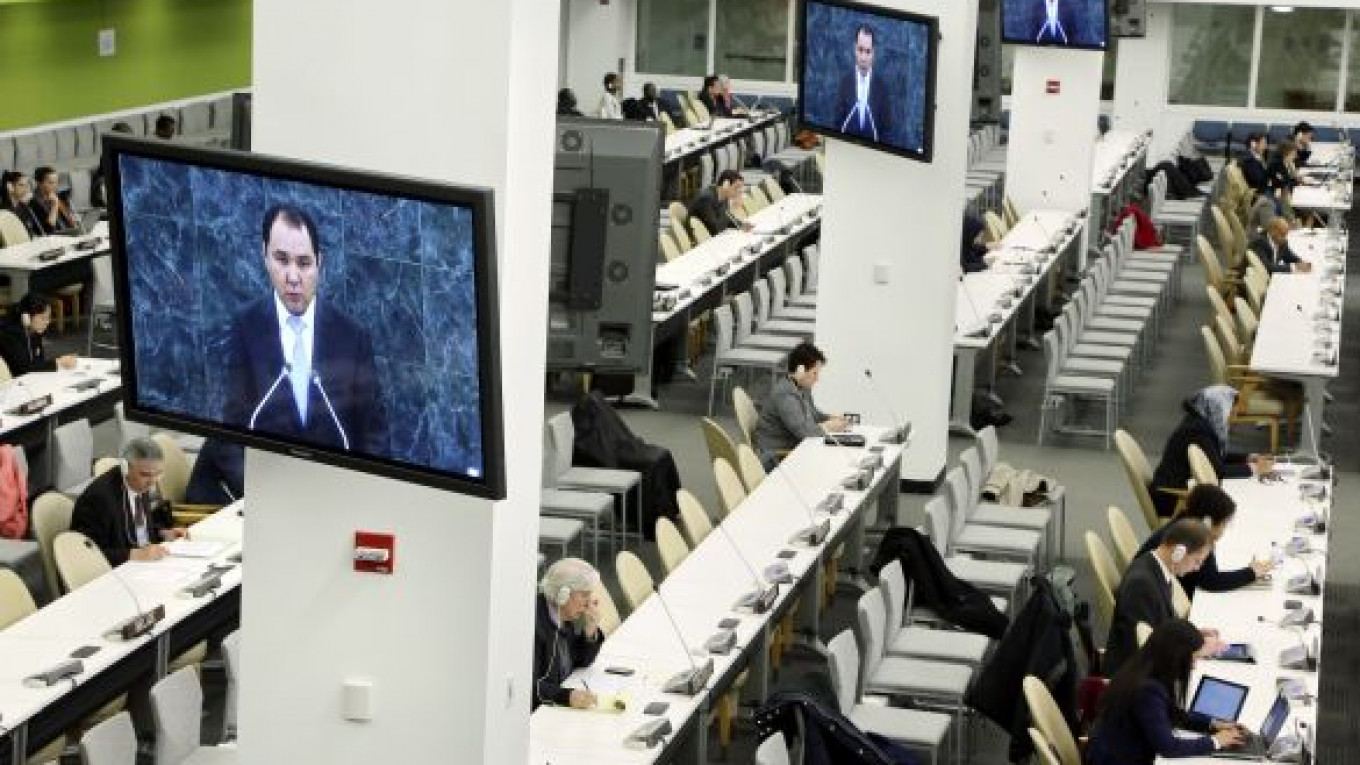UNITED NATIONS — Russia, China, Saudi Arabia and Vietnam are among the nations running unopposed for seats on the Human Rights Council, the United Nations' highest rights watchdog body, a prospect that has independent human rights groups crying foul.
On Tuesday, the General Assembly was set to elect 14 new members to the 47-seat, Geneva-based council, which can shine a spotlight of publicity and censure on rights abuses by adopting resolutions — when it chooses to do so. It also has dozens of special monitors watching problem countries and major issues ranging from executions to drone strikes.
New York-based Human Rights Watch pointed out that five of the candidates — China, Russia, Saudi Arabia, Vietnam and Algeria — have refused to let independent UN human rights monitors visit to investigate alleged abuses.
"Countries that have not allowed UN experts appointed by the council to visit have a lot of explaining to do," said Peggy Hicks, global advocacy director at Human Rights Watch. "It is like hiring someone, then not allowing them to enter the office."
Seats on the council are allotted to regions, and countries from those regions select candidates for those seats. Sometimes the elections are contested and sometimes not. All 193 members of the General Assembly were allowed to vote Tuesday.
The results of the expected vote were not available by press time late Tuesday.
Russia is frequently criticized by Western nations for purported human rights violations, including the prosecution and jailing of Kremlin critics, harsh measures against terrorism suspects, and pressure on civil society groups. Russia often points the finger back at its detractors, accusing countries in the West of infringing on human rights and having a double standard.
The Asian group had unopposed candidates for its four seats: China, the Maldives, Saudi Arabia, and Vietnam.
Saudi Arabia had been expected to run into trouble in the General Assembly vote after it won and then a day later rejected a seat on the Security Council for 2014 to 2015, an unprecedented move. The kingdom was apparently piqued over policy differences with the U.S. on issues in the Middle East, including how Washington has handled the Egypt and Syria crises, and warming ties between the U.S. and Iran, the Saudis' regional foe.
Until last week, Jordan had also been a candidate for the Asian group. But then it dropped out of the Human Rights Council race, clearing the way for Saudi Arabia to win unopposed. Jordan, meanwhile, is angling to replace Saudi Arabia on the Security Council.
"States like China and Vietnam should face questions regarding endemic human rights violations and detained activists, and be pressed to commit to tangible progress when seeking election to the council. Without competition, the lofty goal set in the resolution that established the Human Rights Council that members will uphold the 'highest standards' in human rights is reduced to unenforceable rhetoric," Hicks said.
Geneva-based UN Watch, a frequent critic of UN rights practices, denounced what it considered the worst new candidates. Their list includes Cuba, which is vying with Mexico and Uruguay for two seats representing the Latin American and Caribbean group.
"China, Cuba, Russia, and Saudi Arabia systematically violate the human rights of their own citizens," said UN Watch executive director Hillel Neuer, "and they consistently vote the wrong way on UN initiatives to protect the human rights of others. For the UN to elect Saudi Arabia as a world judge on human rights would be like a town making a pyromaniac into chief of the fire department."
UN Watch is campaigning for the U.S. and Europe to vote "no" on those candidates as well as Algeria and Vietnam. But the votes of Western-style democracies are a minority in the 193-member General Assembly.
UN Watch and other groups have also criticized the Human Rights Council for its preoccupation with reports and resolutions criticizing Israel over the Palestinian issue. By contrast, Neuer said that the council has never adopted a resolution critical of Russia, China, or Saudi Arabia.
The other regional groups are:
- The African group, with five candidates running for four seats: Algeria, Morocco, Namibia, South Africa, and South Sudan.
- The Eastern European group, with Russia and Macedonia running unopposed for two seats.
- The Western European and Others group, with France and Britain running unopposed for two seats.
The U.S. is among the current members of the council, with a term set to expire in 2015.
A Message from The Moscow Times:
Dear readers,
We are facing unprecedented challenges. Russia's Prosecutor General's Office has designated The Moscow Times as an "undesirable" organization, criminalizing our work and putting our staff at risk of prosecution. This follows our earlier unjust labeling as a "foreign agent."
These actions are direct attempts to silence independent journalism in Russia. The authorities claim our work "discredits the decisions of the Russian leadership." We see things differently: we strive to provide accurate, unbiased reporting on Russia.
We, the journalists of The Moscow Times, refuse to be silenced. But to continue our work, we need your help.
Your support, no matter how small, makes a world of difference. If you can, please support us monthly starting from just $2. It's quick to set up, and every contribution makes a significant impact.
By supporting The Moscow Times, you're defending open, independent journalism in the face of repression. Thank you for standing with us.
Remind me later.






